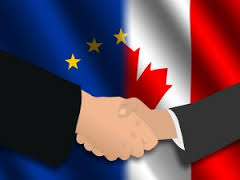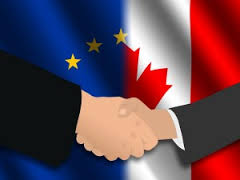
After internal divisions in just one country threatened to block the European Union of 500 million people sealing the landmark deal, Belgium’s regions agreed to a free trade pact with Canada ending weeks of uncertainty.
The regions and linguistic communities had drafted a four-page addendum to the pact that answered their concerns, Prime Minister Charles Michel said.
Specifying that the "investment protection" regime would not come into force during an initial period the text addresses fears that a system to protect foreign investors could let multinationals block new rules on the environment, labour rights or public services. To protect agriculture in the event of a "market imbalance", it also has a safeguard clause.
"As a unilateral Belgian declaration, Canada's approval will not be sought or needed," a source close to the talks said, indicating the path was now clear to finalise the deal.
A cautious welcomes was given to Belgian agreement to the Comprehensive Economic and Trade Agreement (CETA) by European Council President Donald Tusk.
"Only once all procedures are finalised for EU signing CETA, will I contact (Canadian) PM Justin Trudeau," Tusk tweeted.
Ambassadors from other EU countries will review the addendum and Belgium's regional governments have until the end of Friday to consult their parliaments if needed.
While Belgium's central government had been prevented from giving its consent because of objections led by the French-speaking Wallonia region, all 28 EU governments back CETA, which supporters say could increase trade by 20 percent.
With fears about a flood of Canadian farm imports one of the main sticking points, the deal was opposed for weeks by Wallonia, along with the capital Brussels and Belgium's groupings of French and German speakers.
The original 1,598-page text of the trade deal stood, the premier of the Flemish region, Geert Bourgeois, said. "This (the addendum) is a clarification, the actual treaty does not change," he said.
Principally setting out the right of governments to regulate and to answer concerns raised by others, notably Austria, Canada has already agreed to a binding declaration.
With Wallonia still expressing reservations, whether the investment protection system is in line with EU rules, would be asked from the European Court of Justice by Belgium. These as potential time bombs under the deal, described Friends of the Earth.
The EU and Canada still had time to set up a panel of independent judges to settle disputes and the investment protection system did not yet exist, said EU trade commissioner Cecilia Malmstrom.
"We will have more time to do this. We are quite confident that it is perfectly in line with European law," EU trade commissioner Cecilia Malmstrom told Reuters.
Assuming the European Parliament gives its backing, CETA could apply provisionally next year. After all relevant national or regional parliaments have had their say, its final implementation could take a few years.
At a time of low growth, the deal will boost Canada's economy by C$12 billion ($9 billion) and the EU economy by 12 billion euros ($13 billion) per year, supporters say. For Canada, it reduces reliance on the U.S. export market.
(Source:www.cnbc.com)
The regions and linguistic communities had drafted a four-page addendum to the pact that answered their concerns, Prime Minister Charles Michel said.
Specifying that the "investment protection" regime would not come into force during an initial period the text addresses fears that a system to protect foreign investors could let multinationals block new rules on the environment, labour rights or public services. To protect agriculture in the event of a "market imbalance", it also has a safeguard clause.
"As a unilateral Belgian declaration, Canada's approval will not be sought or needed," a source close to the talks said, indicating the path was now clear to finalise the deal.
A cautious welcomes was given to Belgian agreement to the Comprehensive Economic and Trade Agreement (CETA) by European Council President Donald Tusk.
"Only once all procedures are finalised for EU signing CETA, will I contact (Canadian) PM Justin Trudeau," Tusk tweeted.
Ambassadors from other EU countries will review the addendum and Belgium's regional governments have until the end of Friday to consult their parliaments if needed.
While Belgium's central government had been prevented from giving its consent because of objections led by the French-speaking Wallonia region, all 28 EU governments back CETA, which supporters say could increase trade by 20 percent.
With fears about a flood of Canadian farm imports one of the main sticking points, the deal was opposed for weeks by Wallonia, along with the capital Brussels and Belgium's groupings of French and German speakers.
The original 1,598-page text of the trade deal stood, the premier of the Flemish region, Geert Bourgeois, said. "This (the addendum) is a clarification, the actual treaty does not change," he said.
Principally setting out the right of governments to regulate and to answer concerns raised by others, notably Austria, Canada has already agreed to a binding declaration.
With Wallonia still expressing reservations, whether the investment protection system is in line with EU rules, would be asked from the European Court of Justice by Belgium. These as potential time bombs under the deal, described Friends of the Earth.
The EU and Canada still had time to set up a panel of independent judges to settle disputes and the investment protection system did not yet exist, said EU trade commissioner Cecilia Malmstrom.
"We will have more time to do this. We are quite confident that it is perfectly in line with European law," EU trade commissioner Cecilia Malmstrom told Reuters.
Assuming the European Parliament gives its backing, CETA could apply provisionally next year. After all relevant national or regional parliaments have had their say, its final implementation could take a few years.
At a time of low growth, the deal will boost Canada's economy by C$12 billion ($9 billion) and the EU economy by 12 billion euros ($13 billion) per year, supporters say. For Canada, it reduces reliance on the U.S. export market.
(Source:www.cnbc.com)





